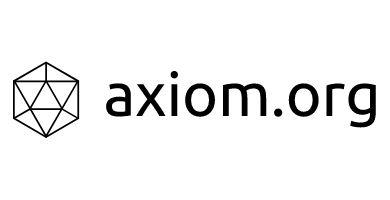A Blockchain Designed for Decentralized Applications
Build, distribute, and run JavaScript-based applications, uncensored by any central authority.The best way to build decentralized applications.
Build your application in any standard frontend JavaScript framework. Store user data via the blockchain, no backend server needed.
- Works with React, Angular, Vue, and more
- Use a simple API to store decentralized data
- Access a single app in multiple ways, to avoid censorship
- Get paid for hosting applications
- Get paid for making a popular app
How It Works
Scalable Storage
The core Axiom blockchain is replicated many times, but stores only the most critical data. Storage buckets are replicated fewer times and store general application data. This design makes it far more cost-effective to run a decentralized application.
Open Distribution
Both the static application bundle and user data are available via JavaScript API, as well as through the WebTorrent protocol. So you can't censor applications or application content by blocking a single URL.
Authentication
Anyone can read data from an application. When a user is writing data, they delegate control to allow the application to write to a single storage bucket. At any time, the user can let a different application use their data.
Frequently Asked Questions
Q. Who works on Axiom?
Axiom is built by Kevin Lacker and a number of open source contributors.
Kevin was previously a cofounder of Parse, a mobile infrastructure service which was acquired by Facebook. Parse aimed to help mobile developers by providing a simple API that in many cases could abstract away backend server logic. Similarly, Axiom aims to provide developers a simple API to abstract away the complexity of building a decentralized application.
If you'd like to help build the platform, or to build decentralized applications, join our Slack and tell us what you're interested in.
Q. How do I build an Axiom app?
The architecture for an Axiom app is similar to the JAM stack. The application logic lives in static HTML and JavaScript. Dynamic user data can be accessed at runtime through the JavaScript Axiom client.
You can start out with your favorite frontend framework, like React, Angular, or Vue. Or you can just start writing a plain old HTML page. Once you have a site that's working locally, you can use the Axiom CLI to deploy it as a decentralized application. You can then access it using the Chrome extension, or anyone can mirror it to a static site.
Q. Why would I want to build an Axiom app?
Our mission is to increase freedom on the internet. Axiom lets you build an app that cannot be blocked by a single hosting provider, or a centralized authority blocking a single URL.
There is also a second, sneakier form of censorship. Sometimes a platform arises that claims to be committed to free speech. But it is still controlled by a single, centralized entity. Over time, that entity comes under pressure from advertisers and politicians, and decides to introduce censorship. With an Axiom application, users control their data, so they can decide to keep their old data while moving to a different application provider. Axiom helps application developers commit to staying open.
Finally, like most other cryptocurrencies Axiom generates new valuable tokens over time through a "mining" model. Some of these tokens are paid to machines running application storage, and some of these tokens are paid out to application developers. So you can make money directly by making a popular Axiom application.
Q. Won't this get taken over by pornography and Nazis?
We don't think so. The Axiom system doesn't force application developers to permit all content. Popular applications can still ban users and decline to display any content they want. Since data is owned by the end user rather than an application, users who are banned from one application can then use their data in other applications. We think that is a reasonable tradeoff to make.
The Axiom system also does not force hosting providers to store any particular content. If a hosting provider gets a takedown request, it is simple to stop hosting that content.
Q. How much money can I make?
Right now, Axiom is in beta. We don't expect the tokens to be worth anything until the main network launches. However, applications built on Axiom will continue to work when the main network launches. User accounts and user data created on the beta network will be airdropped into the main network. So you can start building decentralized applications now, with some hope of getting paid later.
Q. Can I make money mining?
Yes, although we think it is confusing to call it "mining". It is more accurate to call it "hosting". The network needs machines that store both application data and user data, and rewards machines that perform this storage with cryptocurrency tokens.
In particular, Axiom is not a "proof-of-work" cryptocurrency. It uses the Stellar Consensus Protocol for the core operation of its blockchain. The upside of this style of consensus protocol is that the blockchain can operate much more efficiently. This means that very few computing resources need to be expended to gain consensus on blocks, so the primary cost of operating the network is the cost of file hosting.
The downside of this style of consensus protocol is that it is less censorship-resistant. We think this is the right tradeoff to make, because blockchain efficiency is a requirement to make decentralized applications cheap enough to be usable.
